You are using an out of date browser. It may not display this or other websites correctly.
You should upgrade or use an alternative browser.
You should upgrade or use an alternative browser.
‘I will never wear a headscarf again’: Outrage in Iran after woman dies in custody
- Thread starter bnew
- Start date
More options
Who Replied?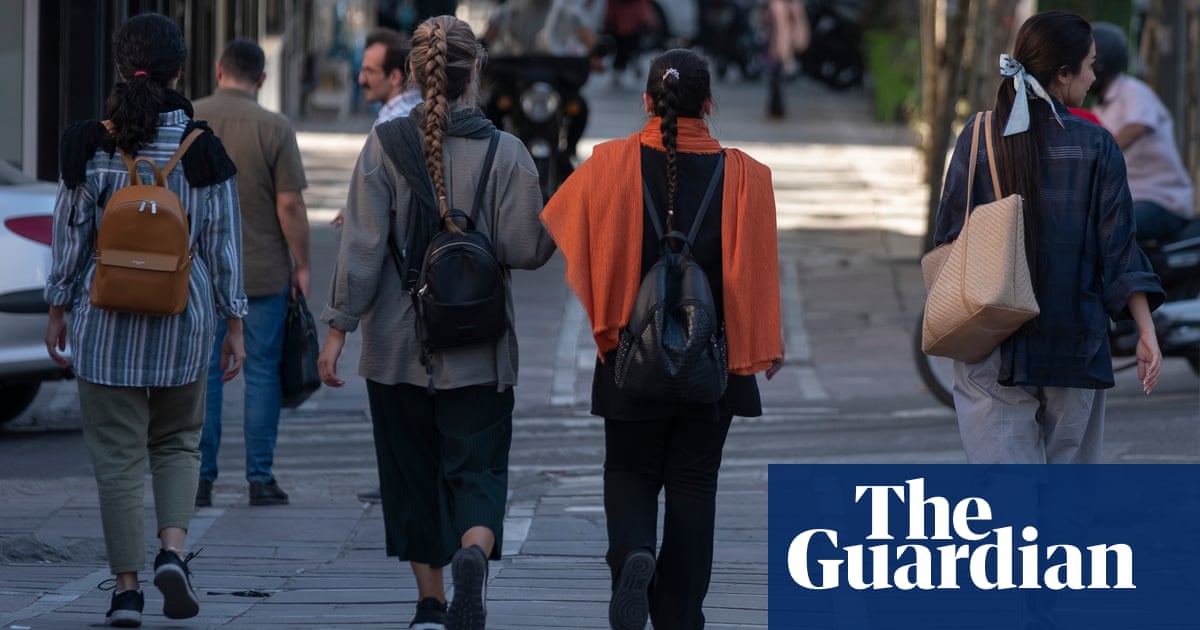
Iran approves stricter hijab bill targeting those who ‘mock’ dress code
Protestors face 10-year jail terms under new hijab and chastity bill, which UN human rights body says is intended to suppress women into ‘total submission’
Iran approves stricter hijab bill targeting those who ‘mock’ dress code
Protestors face 10-year jail terms under new hijab and chastity bill, which UN human rights body says is intended to suppress women into ‘total submission’
Under the new bill, women in Iran face up to 10 years in prison for not wearing the hijab properly. Photograph: NurPhoto/Getty Images
Deepa Parent
Wed 20 Sep 2023 11.55 EDT
Iran’s parliament has approved a controversial new bill under which women face up to 10 years in prison if they continue to defy the country’s mandatory hijab rules.
As well as harsher penalties on women defying the strict dress code, the draft law also intends to identify those who “promote nudity [or] indecency” or “mock” the rules in a virtual or non-virtual space.
UN human rights experts have described it as “tantamount to gender apartheid” with the intention of suppressing women into “total submission”.
“By approving this bill, the Islamic Republic’s parliament has put a massive lock on the bodies of Iranian women. Iran was already an open prison for the women of Iran, but now they’ve extended the brutality with which they will crack down on women by giving serious powers to those implementing it on the streets,” said the Iranian human rights lawyer Hossein Raeesi.

00:02:06
Iran’s new chastity and hijab bill: what you need to know – video
The judiciary’s Mizan news agency reported that the “bill to support the family by promoting the culture of chastity and hijab” was put to vote with 152 in favour, 34 against and seven abstentions. It will apply for an initial three-year trial period.
The bill will require final approval from Iran’s Guardian Council, a powerful body that vets legislation and oversees elections. It comprises 12 men and is headed by a recently re-elected 97-year-old cleric, Ahmad Jannati, who has been its chair since 1988.
Repeated “violators” of the strict dress code (those with more than four violations), and those who dress “inappropriately” will face up to 10 years in prison. The bill also specifies that women who wear “revealing or tight clothing” or show a part of their body “lower than the neck or higher than the ankles or higher than the forearms”, will face tough punishments.
The approval of the hijab bill comes four days after the first anniversary of the death in custody of Mahsa Amini, 22, who had been detained for allegedly wearing the Islamic headscarf incorrectly.

A demonstration in London to mark the first anniversary of the death of Mahsa Amini, 16 September 2023. Photograph: Anadolu Agency/Getty Images
According to human rights groups, security forces have detained dozens of protesters across the country this week, a year after hundreds were killed in protests after Amini’s death on 16 September 2022.
“The Shoraye Negahban (Iran’s Guardian Council) approves anything that the supreme leader backs. So in this case, the parliament’s approval of the bill sets it in stone,” said Rana*, an Iranian protester from Tehran who was detained and interrogated by the “morality police” in August.
“We are not waiting for a seal of approval from the council because, on the ground, they’ve already implemented the law. Women are being followed, harassed, detained and interrogated, like always.”
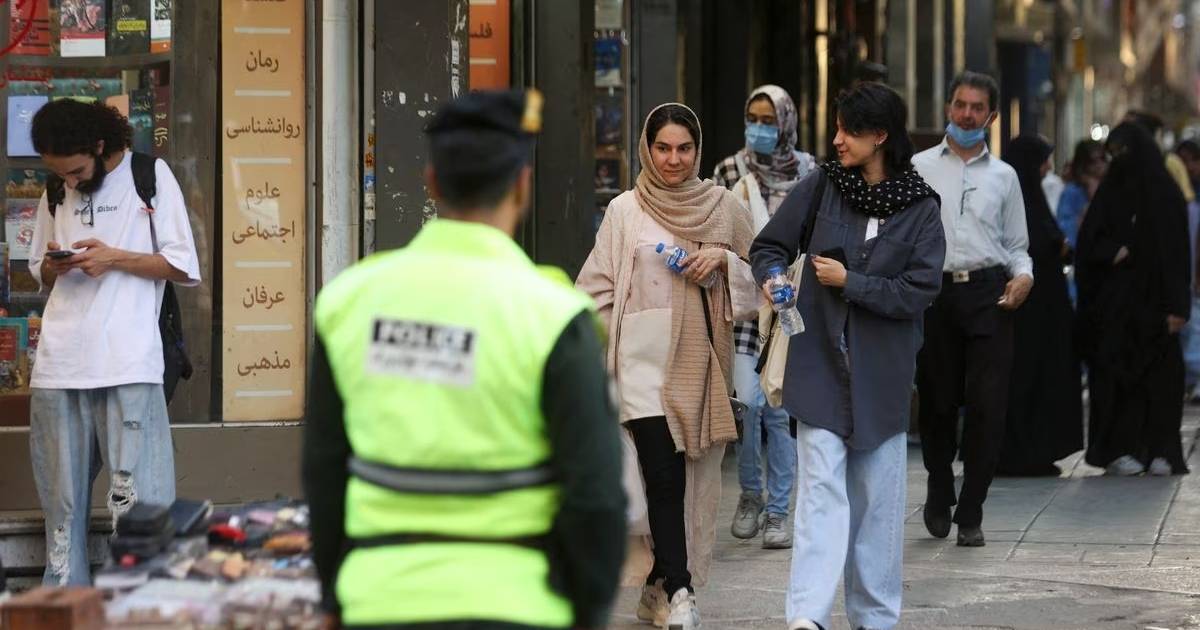
Iran To Deduct Fines From Bank Accounts Of Women Defying Hijab
An Iranian newspaper said Monday that the parliament has approved a law allowing for the deduction of money from the accounts of women who do not adhere to mandatory hijab.
Iran To Deduct Fines From Bank Accounts Of Women Defying Hijab
11 hours ago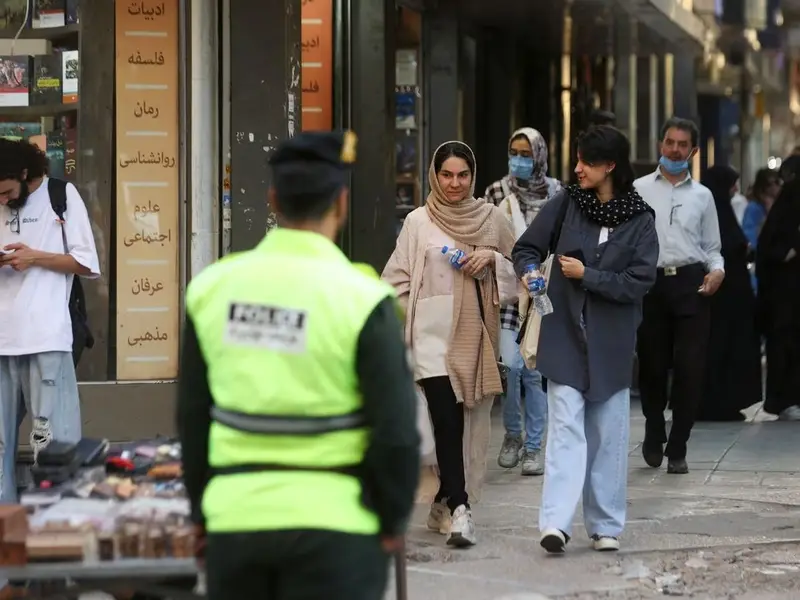
An Iranian newspaper said Monday that the parliament has approved a law allowing for the deduction of money from the accounts of women who do not adhere to mandatory hijab.
The report by Farhikhtegan newspaper confirms recent remarks by lawmaker Amir-Hossein Bankipour, who said fines for women who do not comply with hijab laws will be directly deducted from their bank accounts, without the need for their permission.
The move is based on Iran’s new hijab bill, pending approval by the Guardian Council, that aims to enforce stricter penalties for hijab refuseniks.
The bill, officially titled "Protection of Family Through Promotion of Hijab and Chastity Culture," initially secured parliamentary approval in September. However, it encountered an unexpected setback when the Guardian Council, holding ultimate legislative authority, rejected it. The rejection cited formal deficiencies and called for revisions to clarify ambiguous terms.
The enforcement strategy includes surveillance measures such as facial recognition technology and scrutiny of online content to identify violators. Bankipour emphasized that “the measures aim to deter repeat offenses,” with fines escalating to 240 million rials ($400) for those who remove hijab for the second time.
Farhikhtegan wrote that enforcing penalties for hijab violations falls outside the judiciary's jurisdiction; the police will handle enforcement.
The announcement comes against the backdrop of heightened tensions surrounding hijab enforcement, fueled by widespread protests following the death of Mahsa Amini in 2022. Amini's death after her arrest for violating hijab regulations ignited the boldest wave of protests against the Islamic Republic.
I am so grateful I don’t have to live under a system like that.
Iran To Deduct Fines From Bank Accounts Of Women Defying Hijab
An Iranian newspaper said Monday that the parliament has approved a law allowing for the deduction of money from the accounts of women who do not adhere to mandatory hijab.www.iranintl.com
Iran To Deduct Fines From Bank Accounts Of Women Defying Hijab
11 hours ago
Iranian women walk on a street during the revival of morality police in Tehran, Iran, July 16, 2023.
An Iranian newspaper said Monday that the parliament has approved a law allowing for the deduction of money from the accounts of women who do not adhere to mandatory hijab.
The report by Farhikhtegan newspaper confirms recent remarks by lawmaker Amir-Hossein Bankipour, who said fines for women who do not comply with hijab laws will be directly deducted from their bank accounts, without the need for their permission.
The move is based on Iran’s new hijab bill, pending approval by the Guardian Council, that aims to enforce stricter penalties for hijab refuseniks.
The bill, officially titled "Protection of Family Through Promotion of Hijab and Chastity Culture," initially secured parliamentary approval in September. However, it encountered an unexpected setback when the Guardian Council, holding ultimate legislative authority, rejected it. The rejection cited formal deficiencies and called for revisions to clarify ambiguous terms.
The enforcement strategy includes surveillance measures such as facial recognition technology and scrutiny of online content to identify violators. Bankipour emphasized that “the measures aim to deter repeat offenses,” with fines escalating to 240 million rials ($400) for those who remove hijab for the second time.
Farhikhtegan wrote that enforcing penalties for hijab violations falls outside the judiciary's jurisdiction; the police will handle enforcement.
The announcement comes against the backdrop of heightened tensions surrounding hijab enforcement, fueled by widespread protests following the death of Mahsa Amini in 2022. Amini's death after her arrest for violating hijab regulations ignited the boldest wave of protests against the Islamic Republic.

Iran To Prosecute Sender Of Hijab Altercation Video To IITV
Iranian authorities will prosecute the individual who sent a video to Iran International TV depicting a scuffle over hijab at a clinic, leading to widespread outrage on social media.

Iran To Prosecute Sender Of Hijab Altercation Video To IITV
Sunday, 03/10/2024Maryam Sinaiee
A British Iranian journalist and political analyst and a regular contributor to Iran International
Iranian authorities will prosecute the individual who sent a video to Iran International TV depicting a scuffle over hijab at a clinic, leading to widespread outrage on social media.
The video went viral in Iran on Saturday depicting a tense encounter between a young woman and a cleric who is filming her holding her baby while her hijab is loose in a clinic in the religious city of Qom.
Iran’s clerical rulers encourage everyone to confront women with insufficient hijab and urge them to abide by the law. Reporting on others is also encouraged and there have been instances of people filming women to send it to the authorities for legal action.
The incident escalated into a brawl when the young woman noticed the cleric filming her. Other women in the hospital intervened and asked the cleric to delete his video in fear that it would lead to further problems for the mother.
The footage captured the young mother in the clinic with her sick infant. Shortly after entering, her headscarf slips off.
Hassan Gharib, the prosecutor of the religious city of Qom, said Sunday that an order to identify and prosecute the person who leaked the CCTV footage to Iran International has been issued. However, he clarified that no arrests have been made in connection with the incident.
Hassan Gharib, the prosecutor of the religious city of Qom
Gharib emphasized the importance of adhering to the religious duty of urging others to abstain from forbidden acts and uphold religious principles. “In any case, we will decisively, fairly, and speedily investigate the matter.”
Typically, rather than prosecuting people who bother others over hijab, authorities often target and punish victims, as well as individuals who share photos and videos with foreign-based Persian media outlets that tarnish the image of the regime, its officials, or clerics.
In September, 29-year-old Elham Farshad who had a verbal encounter with a cleric harassing her over hijab was sentenced to three years and eight months in prison after a video of the incident was leaked on social media.
“It is necessary to point out that the error of the person who sent the video to anti-revolutionary media should not be overlooked. This calls for intelligence work and action that will teach [such people] a lesson,” the Revolutionary Guards (IRGC) linked Fars News Agency wrote Sunday.
At a press briefing Sunday most of which was related to the controversies over legislation and enforcement of hijab, President Ebrahim Raisi’s aide, Sakineh-Sadat Pad, said she had seen the video and would follow up on the matter.
Pad characterized the actions of both the woman and the cleric as "aggressive" and their behavior as "disagreeable." While acknowledging the understandable concern of the young mother for her sick child, Pad did not explicitly condemn the cleric's infringement upon the woman's privacy and rights. She emphasized the need for further investigation into the matter.
The footage obtained by Iran International (IITV) from the clinic's CCTV captures the young woman seated against the wall in a secluded area, cradling her sick baby in her arms. Her hijab has slipped down over her shoulders. In the background, the cleric covertly uses his mobile device to capture pictures or video of the woman, presumably to document her violation of hijab regulations.
Upon realizing the cleric's actions, the woman swiftly passes her baby to someone nearby and confronts the cleric, demanding to inspect his phone to delete the recorded footage. The cleric refuses, escalating the situation into a physical altercation as bystanders intervene.
The cleric flees the scene, and the woman is taken away from by the clinic staff after having a nervous fit. The identities of the cleric and the woman are not known.
Some Twitterati have commented that the incident is evidence of the opposition to compulsory hijab and shows that the Islamic Republic has failed in enforcing it even in Qom, Iran's second religious city and the seat of most of its seminaries.
Most hardliner social media users have blamed the woman for failing to comply with hijab rules and then arguing with the cleric and charging to attack him. They justify the cleric’s actions by arguing that his intention was pure, and he only wanted to carry out his religious duty.
Some hardline, pro-government social media users have called the young mother “rowdy” or “a shrew”. Those against the compulsory hijab, however, have created several hashtags in support of the young mother such as “We Are All Rowdy/Shrews”.

Iranian Lawyers Slam Morality Police Over Hijab Enforcement
A group of 61 lawyers has issued a condemnation of the morality police's aggressive tactics in Iran, particularly criticizing the controversial Nour project to enforce hijab.
www.iranintl.com

Iranian Lawyers Slam Morality Police Over Hijab Enforcement
Saturday, 04/27/2024Iran International Newsroom
A group of 61 lawyers has issued a condemnation of the morality police's aggressive tactics in Iran, particularly criticizing the controversial Nour project to enforce hijab.
Nour, the regime’s new hijab enforcement plan, has seen Iranian authorities escalate their physical efforts to enforce the Islamic Republic’s strict hijab laws. It has led to a surge in violent crackdowns targeting women on Iranian streets.
The lawyers declared such actions illegal and in violation of both the national constitution and international human rights agreements.
"Continuing these policies will undoubtedly lead to more conflict, confrontation, and insecurity in society, and will create more harmful aspects for women," read the statement.
Despite the government's efforts to enforce mandatory hijab laws, a strong wave of civil disobedience continues. Many women have been seen in public spaces without a hijab, protesting against these impositions.
Contrasting with this criticism, Grand Ayatollah Naser Makarem Shirazi sent a supportive message to Ahmadreza Radan, Iran’s Police Chief, encouraging him to enforce the hijab laws with "strength and determination." Radan echoed the sentiment, emphasizing the perceived threat if such moves are not upheld: "If the enemy overcomes the trench of chastity and hijab, nothing will remain for us."
Recent crackdowns, initiated following a directive by Supreme Leader Ali Khamenei on April 13, have led to the arrest of hundreds of women across various cities in Iran. Yet, the spirit of resistance among Iranian women remains strong. In one notable incident, a woman was arrested at the Beheshti judicial complex in Tehran for appearing without a hijab, stating, "I have come here with hijab all my life; this time I came without a hijab to reclaim my rights."
Whooty Chaser
#PAWGSET
shyt country
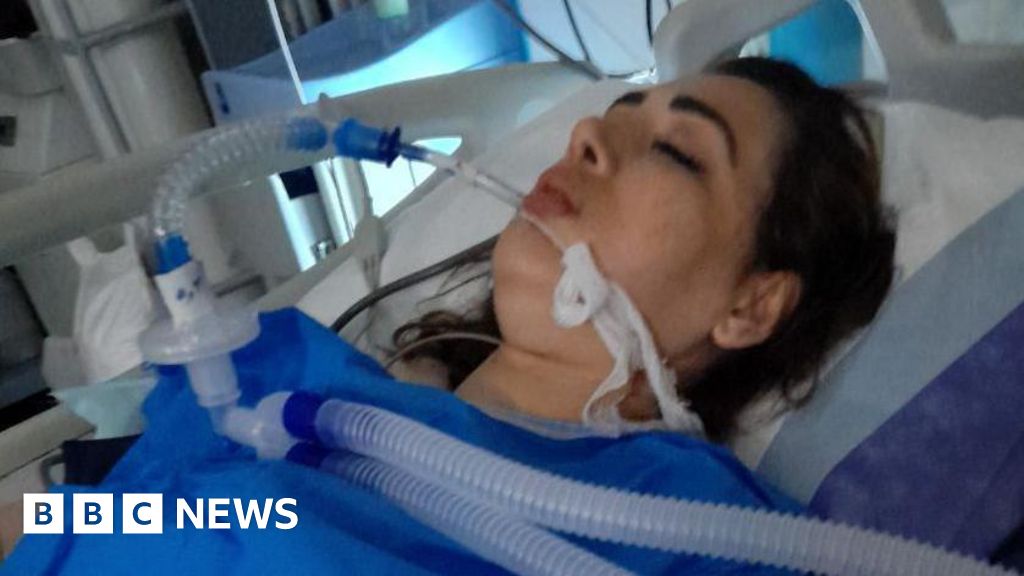
Iran: Woman left paraplegic after being shot by police over hijab
A source told the BBC police shot at Arezoo Badri's car before targeting her directly.
Iranian woman paralysed after being shot over hijab
1 day ago
Parham Ghobadi
BBC Persian
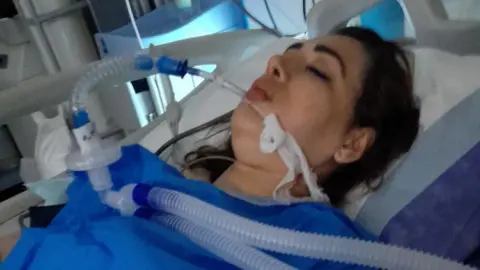
A source said a bullet fired by police had "severely damaged" Arezoo Badri's spinal cord
A mother of two has been left paraplegic after being shot by Iranian police over an alleged violation of the country's strict hijab rules, a source with knowledge of the case has told the BBC.
"She is paralysed from the waist down, and doctors have said it will take months to determine whether she will be permanently paraplegic or not."
Arezoo Badri, 31, was driving home with her sister in the northern city of Noor on 22 July when police attempted to pull her over to confiscate her car.
The driver did not comply with the order to stop, prompting the officers to shoot, the police commander in Noor told Iran's state-run news agency, without naming Ms Badri.
The incident comes after Iranian police announced a clampdown on women defying the nation's compulsory dress code.
The fresh measures included using CCTV to identify female drivers failing to cover their heads and the confiscation of vehicles found to be carrying female passengers with uncovered hair.
It followed prolonged public outcry over the law in the wake of the death of Mahsa Amini in 2022 while being detained by Iran's morality police for allegedly wearing her hijab, or headscarf, "improperly".
It is unclear whether Ms Badri was wearing a headscarf when she was stopped by police, but her car had a confiscation notice against it - suggesting multiple alleged violations of the hijab law.
The BBC source said the police officer first shot at the car's tyre before targeting her directly from the driver's side.
"The bullet entered her lung and severely damaged her spinal cord."
Colonel Ahmed Amini, Noor's police chief, said the use of firearms was permitted under Iranian law.
After being initially taken to a hospital in Noor, Ms Badri was transferred to a hospital in Sari, the provincial capital, for lung surgery. A week later she was taken to the Iranian capital, Tehran.
The bullet was only removed after 10 days, the source said.
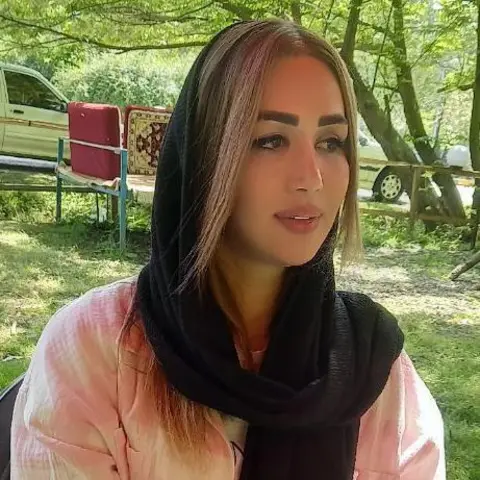
Police said Ms Badri failed to stop her car, which had a confiscation notice
Both the police and the BBC source said that Ms Badri's car windows were tinted.
Ms Badri is now in the intensive care unit of the police-owned Vali-e-Asr Hospital in Tehran and under tight security.
According to the source, her family is allowed only brief visits, during which their mobile phones are confiscated. Authorities have prohibited visitors from taking photos or video of Ms Badri - though some have emerged.
The heavy security measures surrounding Ms Badri's hospitalisation are reminiscent of those of Armita Geravand, a 17-year-old who died in October after spending 28 days in a coma at Fajr Hospital in Tehran, following an alleged altercation with the morality police at an underground station.
Human rights activists said that she was assaulted for not wearing a hijab, an allegation that the Iranian government denies.
Women have been legally required to wear a hijab in Iran since the Islamic revolution of 1979. Penalties for infringements of the law include fines and imprisonment.
Incidents involving the morality police - who are tasked with enforcing the law - continue to be reported while the Women, Life, Freedom movement Ms Amini's death sparked remains ongoing.
Iranian women have previously told the BBC they were still willing to defy the rule despite the increased risk of punishment.
Recently, CCTV footage showing the violent assault of a 14-year-old girl by hijab enforcement officers in Tehran ignited widespread outrage.
Nafas Hajisharif's mother told Iran’s Ensaf News that she found her daughter at a morality police station with a "bruised face, swollen lips, a bruised neck, and torn clothes".
This was a mischief making khazars doing
Iran: Woman left paraplegic after being shot by police over hijab
A source told the BBC police shot at Arezoo Badri's car before targeting her directly.www.bbc.com
Iranian woman paralysed after being shot over hijab
1 day ago
Parham Ghobadi
BBC Persian
BBC
A source said a bullet fired by police had "severely damaged" Arezoo Badri's spinal cord
A mother of two has been left paraplegic after being shot by Iranian police over an alleged violation of the country's strict hijab rules, a source with knowledge of the case has told the BBC.
"She is paralysed from the waist down, and doctors have said it will take months to determine whether she will be permanently paraplegic or not."
Arezoo Badri, 31, was driving home with her sister in the northern city of Noor on 22 July when police attempted to pull her over to confiscate her car.
The driver did not comply with the order to stop, prompting the officers to shoot, the police commander in Noor told Iran's state-run news agency, without naming Ms Badri.
The incident comes after Iranian police announced a clampdown on women defying the nation's compulsory dress code.
The fresh measures included using CCTV to identify female drivers failing to cover their heads and the confiscation of vehicles found to be carrying female passengers with uncovered hair.
It followed prolonged public outcry over the law in the wake of the death of Mahsa Amini in 2022 while being detained by Iran's morality police for allegedly wearing her hijab, or headscarf, "improperly".
It is unclear whether Ms Badri was wearing a headscarf when she was stopped by police, but her car had a confiscation notice against it - suggesting multiple alleged violations of the hijab law.
The BBC source said the police officer first shot at the car's tyre before targeting her directly from the driver's side.
"The bullet entered her lung and severely damaged her spinal cord."
Colonel Ahmed Amini, Noor's police chief, said the use of firearms was permitted under Iranian law.
After being initially taken to a hospital in Noor, Ms Badri was transferred to a hospital in Sari, the provincial capital, for lung surgery. A week later she was taken to the Iranian capital, Tehran.
The bullet was only removed after 10 days, the source said.

Police said Ms Badri failed to stop her car, which had a confiscation notice
Both the police and the BBC source said that Ms Badri's car windows were tinted.
Ms Badri is now in the intensive care unit of the police-owned Vali-e-Asr Hospital in Tehran and under tight security.
According to the source, her family is allowed only brief visits, during which their mobile phones are confiscated. Authorities have prohibited visitors from taking photos or video of Ms Badri - though some have emerged.
The heavy security measures surrounding Ms Badri's hospitalisation are reminiscent of those of Armita Geravand, a 17-year-old who died in October after spending 28 days in a coma at Fajr Hospital in Tehran, following an alleged altercation with the morality police at an underground station.
Human rights activists said that she was assaulted for not wearing a hijab, an allegation that the Iranian government denies.
Women have been legally required to wear a hijab in Iran since the Islamic revolution of 1979. Penalties for infringements of the law include fines and imprisonment.
Incidents involving the morality police - who are tasked with enforcing the law - continue to be reported while the Women, Life, Freedom movement Ms Amini's death sparked remains ongoing.
Iranian women have previously told the BBC they were still willing to defy the rule despite the increased risk of punishment.
Recently, CCTV footage showing the violent assault of a 14-year-old girl by hijab enforcement officers in Tehran ignited widespread outrage.
Nafas Hajisharif's mother told Iran’s Ensaf News that she found her daughter at a morality police station with a "bruised face, swollen lips, a bruised neck, and torn clothes".
Why in the hell would a Muslim man shoot a woman for not wearing a hijab
MoshpitMazi
Moshpit Gxng/ Anti Fash
Why only smoke for their women?
Women in Iran are going without hijabs as the 2nd anniversary of Mahsa Amini's death approaches
The country’s new reformist President Masoud Pezeshkian campaigned on a promise to halt the harassment of women by morality police
Women in Iran are going without hijabs as the 2nd anniversary of Mahsa Amini’s death approaches
1 of 6 |
FILE - Iranian women without a mandatory headscarf, or hijab, walk past a banner showing missiles being launched from Iranian map in northern Tehran, Iran, April 19, 2024. (AP Photo/Vahid Salemi, File)
2 of 6 |
FILE - An Iranian woman without wearing her mandatory Islamic headscarf flashes a victory sign as two head-to-toe veiled women walk at the old main bazaar of Tehran, Iran, June 13, 2024. (AP Photo/Vahid Salemi, File)
3 of 6 |
FILE - An Iranian woman without wearing her mandatory Islamic headscarf walks in downtown Tehran, Iran, June 10, 2024. (AP Photo/Vahid Salemi, File)
4 of 6 |
FILE - An Iranian woman without a mandatory headscarf, or hijab, walks at the old main bazaar of Tehran, Iran, June 13, 2024. (AP Photo/Vahid Salemi, File)
5 of 6 |
FILE - An Iranian woman, without a mandatory headscarf, or hijab, walks in downtown Tehran, Iran, June 10, 2024. (AP Photo/Vahid Salemi, File)
6 of 6 |
FILE - An Iranian woman without a mandatory headscarf, or hijab, flashes a victory sign as she walks at the old main bazaar of Tehran, Iran, June 13, 2024. (AP Photo/Vahid Salemi, File)
By JON GAMBRELL
Updated 1:25 AM EDT, September 14, 2024
Share
DUBAI, United Arab Emirates (AP) — On the streets of Iranian cities, it’s becoming more common to see a woman passing by without a mandatory headscarf, or hijab, as the second anniversary of the death of Mahsa Amini and the mass protests it sparked approaches.
There’s no government official or study acknowledging the phenomenon, which began as Iran entered its hot summer months and power cuts in its overburdened electrical system became common. But across social media, videos of people filming neighborhood streets or just talking about a normal day in their life, women and girls can be seen walking past with their long hair out over their shoulders, particularly after sunset.
FILE - An Iranian woman without a mandatory headscarf, or hijab, flashes a victory sign as she walks at the old main bazaar of Tehran, Iran, June 13, 2024. (AP Photo/Vahid Salemi, File)
This defiance comes despite what United Nations investigators describe as “expanded repressive measures and policies” by Iran’s theocracy to punish them — though there’s been no recent catalyzing event like Amini’s death to galvanize demonstrators.
The country’s new reformist President Masoud Pezeshkian campaigned on a promise to halt the harassment of women by morality police. But the country’s ultimate authority remains the 85-year-old Supreme Leader Ayatollah Ali Khamenei, who in the past said “unveiling is both religiously forbidden and politically forbidden.”
For some observant Muslim women, the head covering is a sign of piety before God and modesty in front of men outside their families. In Iran, the hijab — and the all-encompassing black chador worn by some — has long been a political symbol as well.
“Meaningful institutional changes and accountability for gross human rights violations and crimes under international law, and crimes against humanity, remains elusive for victims and survivors, especially for women and children,” warned a U.N. fact-finding mission on Iran on Friday.
FILE - An Iranian woman, without a mandatory headscarf, or hijab, walks in downtown Tehran, Iran, June 10, 2024. (AP Photo/Vahid Salemi, File)
Amini, 22, died on Sept. 16, 2022, in a hospital after her arrest by the country’s morality police over allegedly not wearing her hijab to the liking of the authorities. The protests that followed Amini’s death started first with the chant “Women, Life, Freedom.” However, the protesters’ cries soon grew into open calls of revolt against Khamenei.
A monthslong security crackdown that followed killed more than 500 people and saw over 22,000 detained.
Today, passersby on the streets of Tehran, whether its tony northern suburbs for the wealthy or the working-class neighborhoods of the capital’s southern reaches, now routinely see women without the hijab. It particularly starts at dusk, though even during the daylight on weekends women can be seen with their hair uncovered at major parks.
Online videos — specifically a sub-genre showing walking tours of city streets for those in rural areas or abroad who want to see life in the bustling neighborhoods of Tehran — include women without the hijab.
FILE - An Iranian woman without a mandatory headscarf, or hijab, walks at the old main bazaar of Tehran, Iran, June 13, 2024. (AP Photo/Vahid Salemi, File)
Something that would have stopped a person in their tracks in the decades follwing the 1979 Islamic Revolution now goes unacknowledged.
“My quasi-courage for not wearing scarves is a legacy of Mahsa Amini and we have to protect this as an achievement,” said a 25-year-old student at Tehran Sharif University, who gave only her first name Azadeh out of fear of reprisal. “She could be at my current age if she did not pass away.”
The disobedience still comes with risk. Months after the protests halted, Iranian morality police returned to the streets.
There have been scattered videos of women and young girls being roughed up by officers in the time since. In 2023, a teenage Iranian girl was injured in a mysterious incident on Tehran’s Metro while not wearing a headscarf and later died in hospital. In July, activists say police opened fire on a woman fleeing a checkpoint in an attempt to avoid her car being impounded for her not wearing the hijab.
FILE - An Iranian woman without wearing her mandatory Islamic headscarf flashes a victory sign as two head-to-toe veiled women walk at the old main bazaar of Tehran, Iran, June 13, 2024. (AP Photo/Vahid Salemi, File)
Meanwhile, the government has targeted private businesses where women are seen without their headscarves. Surveillance cameras search for women uncovered in vehicles to fine and impound their cars. The government has gone as far as use aerial drones to monitor the 2024 Tehran International Book Fair and Kish Island for uncovered women, the U.N. said.
Yet some feel the election of Pezeshkian in July, after a helicopter crash killed Iranian hard-line President Ebrahim Raisi in May, is helping ease tensions over the hijab.
“I think the current peaceful environment is part of the status after Pezeshkian took office,” said Hamid Zarrinjouei, a 38-year-old bookseller. “In some way, Pezeshkian could convince powerful people that more restrictions do not necessarily make women more faithful to the hijab.”
On Wednesday, Iran’s Prosecutor General Mohammad Movahedi Azad warned security forces about starting physical altercations over the hijab.
“We prosecuted violators, and we will,” Movahedi Azad said, according to Iranian media. “Nobody has right to have improper attitude even though an individual commits an offense.”
While the government isn’t directly addressing the increase in women not wearing hijabs, there are other signs of a recognition the political landscape has shifted. In August, authorities dismissed a university teacher a day after he appeared on state television and dismissively referred to Amini as having “croaked.”
Meanwhile, the pre-reform newspaper Ham Mihan reported in August on an unpublished survey conducted under the supervision of Iran’s Ministry of Culture and Islamic Guidance that found the hijab had become one of the most important issues in the country — something it hadn’t seen previously.
“This issue has been on people’s minds more than ever before,” sociologist Simin Kazemi told the newspaper.
Json
Superstar
Imagine putting so much energy into a piece of cloth, draped on the head, will somehow fix the problems in the country
the cac mamba
Veteran
sharia law is a fukking disgrace
disgusting how all these liberals, who have so much energy for women's rights, and "freeing palestine", have zero to say about this
disgusting how all these liberals, who have so much energy for women's rights, and "freeing palestine", have zero to say about this
THIS IS WHAT A “FREE PALESTINE” WOULD LOOK LIKE